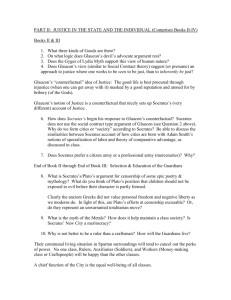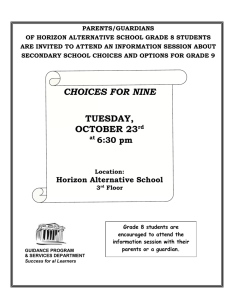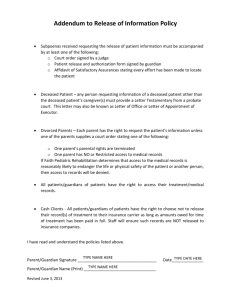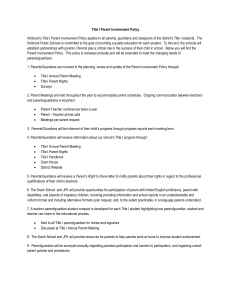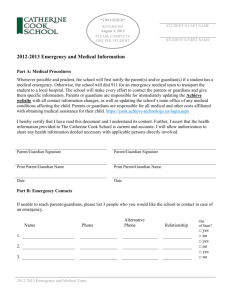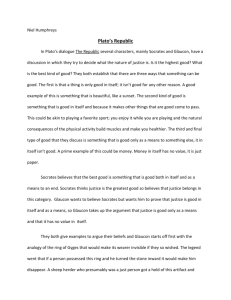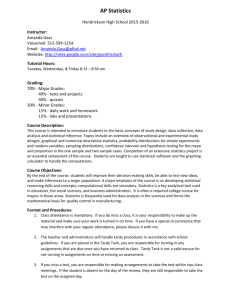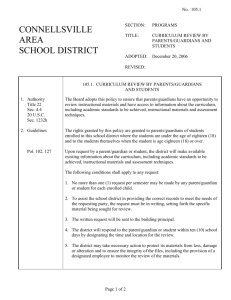Nelson 1 The Republic Book XI After I had finished telling the myth
advertisement
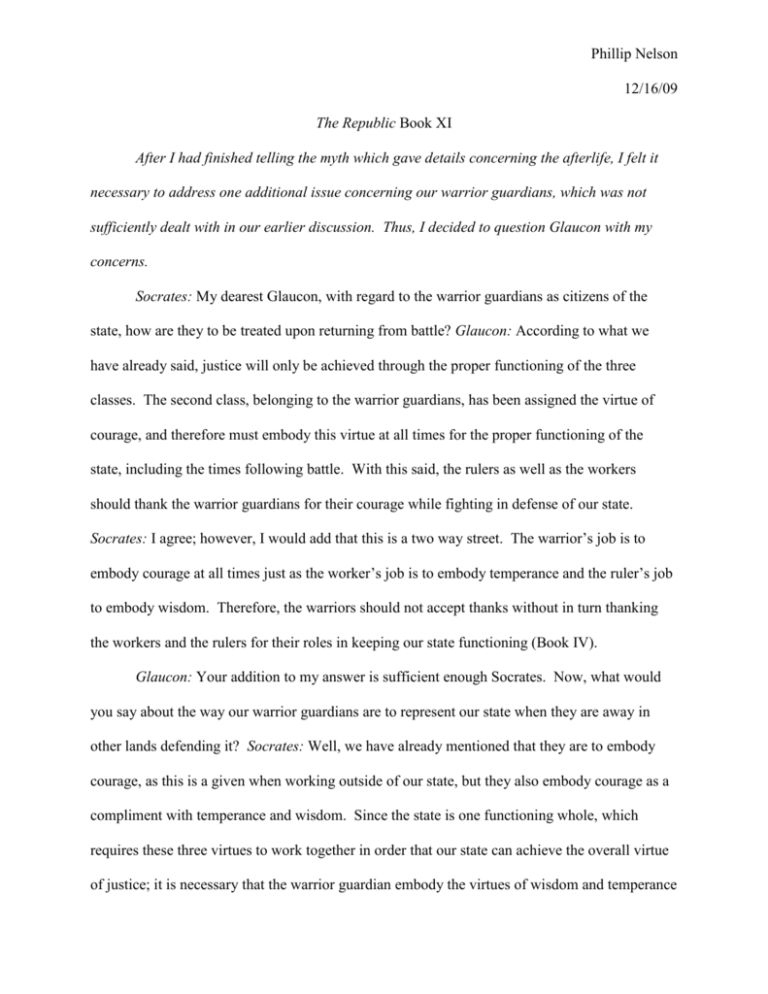
Phillip Nelson 12/16/09 The Republic Book XI After I had finished telling the myth which gave details concerning the afterlife, I felt it necessary to address one additional issue concerning our warrior guardians, which was not sufficiently dealt with in our earlier discussion. Thus, I decided to question Glaucon with my concerns. Socrates: My dearest Glaucon, with regard to the warrior guardians as citizens of the state, how are they to be treated upon returning from battle? Glaucon: According to what we have already said, justice will only be achieved through the proper functioning of the three classes. The second class, belonging to the warrior guardians, has been assigned the virtue of courage, and therefore must embody this virtue at all times for the proper functioning of the state, including the times following battle. With this said, the rulers as well as the workers should thank the warrior guardians for their courage while fighting in defense of our state. Socrates: I agree; however, I would add that this is a two way street. The warrior’s job is to embody courage at all times just as the worker’s job is to embody temperance and the ruler’s job to embody wisdom. Therefore, the warriors should not accept thanks without in turn thanking the workers and the rulers for their roles in keeping our state functioning (Book IV). Glaucon: Your addition to my answer is sufficient enough Socrates. Now, what would you say about the way our warrior guardians are to represent our state when they are away in other lands defending it? Socrates: Well, we have already mentioned that they are to embody courage, as this is a given when working outside of our state, but they also embody courage as a compliment with temperance and wisdom. Since the state is one functioning whole, which requires these three virtues to work together in order that our state can achieve the overall virtue of justice; it is necessary that the warrior guardian embody the virtues of wisdom and temperance Nelson 2 along with his natural virtue of courage. He is our only representation of the state as we cannot show the worker or the ruler in other lands, for they must attend to their duties within the walls of our state. Glaucon: Your answer seems sufficient enough, although perhaps you could address exactly how the warrior is to represent wisdom, as wisdom is not his assigned virtue, and we have not prepared our warriors to exhibit it. Socrates: You are correct to acknowledge this contradiction, and I will attempt to answer it as best I can. As I am now reflecting on our answer to my first question, I would add that it would be also necessary to provide the guardians with an education upon returning from battle, at least for those who wish to possess wisdom as a way towards becoming a ruler or leader. Not all will qualify for such education, but it should be provided without hassle to those who both qualify and desire such an opportunity. These wisdom-warriors should become the leaders of our courageous-warriors for there will be fewer guardians in number who desire to be educated. In this way, the guardians who return from battle will be rewarded with an education, and they will also be prepared to represent our state with courage and wisdom while engaged in our defense. Glaucon: I understand your answer quite well, and now that we have stated why it is necessary for the guardian to represent our state with wisdom and courage, as well as how this might be possible, could we now speak more about our guardian’s return from battle? Socrates: Most certainly, but what is it exactly that we should understand more clearly? Glaucon: If the warrior’s job is to engage in defense with courage at all times, what is his role upon returning to peace within the walls of our state? Socrates: The guardians who choose not to participate in our offers of education must keep up their military training so that they are in peak shape for the next battle. By working together and building confidence in each other’s ability, they are also Nelson 3 able to build relationships and ultimately camaraderie, which is an essential part of their courage in battle. Glaucon: As the warrior gets older, and is no longer physically able to serve as such, what should be done to make sure his time is occupied with meaningful contribution to our state? Socrates: This is a difficult question, so we must be especially careful in how we answer it. At this time, our conversation was interrupted with the arrival of another guest. It was Aristotle, Plato’s former pupil. He seemed eager to sit and participate in our dialogue. After I filled him in with our current discussion of the warrior guardians, and the course of action with regard to the retired warrior, he proceeded to answer in my place. Aristotle: Every action is for the sake of an end. That is, there is always an end beyond every act. With regard to the warrior guardians you describe, their end is to provide courage for the state, and their act, which is for the sake of achieving this end, is to fight in defense of our state. But it must always be kept in mind that their starting point is not the act, but rather the end. Now, in the case of the retired guardian, his starting point, or end through which all his actions have a cause, must change. Otherwise there will be no reason for any of his actions, and they will be without an end. He will most likely be rendered motionless if he does not have a starting point. Glaucon: Your answer, Aristotle, is most interesting with regard to what you describe as an end. I have heard Socrates’ answer, but what would you say about the guardian’s actions when he comes back from battle? Should he pursue education, or training, or rest, or all three? Aristotle: My answer would not change in this case. There may be some ends which are subordinate to an ultimate end, and in the case of the guardian returning from battle; education, training, or rest may constitute ends, which are for the sake of a larger end, which may be to provide the courage for our state. Insofar as he achieves this end, he has fulfilled his position as the guardian. However, he is not done. He must continue to act in accordance with this end until Nelson 4 it is no longer his end. Human life is always a continuous process of acting for the sake of an end (Nicomachean Ethics Book 1). Glaucon: Your answer, Aristotle, is most impressive. Socrates, I would now like to hear what you have to say about camaraderie in relation to courage, as this was briefly mentioned before Aristotle arrived. Socrates: Yes, the building of comradeship is more easily accomplished in battle than it is when returning from battle. This is for the simple reason that guardians are able to act with courage more easily in battle than when behind the walls of our state. But my basic idea is that everyone hold a sense of responsibility for the justice which is established in our state. When courage and wisdom act together they form justice. When the worker performs his task he is doing his part to achieve justice within the state. When the ruler acts with wisdom, and makes a decision with regard to the citizens, he is doing his part to achieve justice. These activities, all necessarily working together to achieve the ultimate virtue of justice, also have a relationship building affect on the individuals of our state. In this way, the guardians are not the only ones capable of building comradeship; although, I would say it is much easier for the guardian who is forced to work in such close proximity to his fellow guardians. Glaucon: My final question is with regard to the wounded guardian. For what I have learned from Aristotle about the guardian’s end, and what I have learned from Socrates about comradeship among fellow guardians, it seems that the wounded guardian might have a difficult time if he is not able to return to his duties as a guardian. Aristotle: This is probably very true especially because his situation has changed. Every starting point must originate from what is known to us (Book 1, Ch.4). In the case of the guardian, his situation was known as that of guardianship, this is what he is raised to do and it is all he knows. When the guardian is no Nelson 5 longer able to serve in battle, he must reassess his situation, and find a new starting point for his actions. In the mean time, his confidence will only hold up as long as he is able to find temporary ends to act through, e.g., surviving whatever wounds he has suffered in battle. Socrates: Building off what Aristotle says, the camaraderie built around the guardian’s life is now ripped away from him. He is forced to build new relationships which are sure to fail in comparison with the ones he built in the military. The wounded guardian is no longer what once made him proud, and he will never establish the same type of camaraderie which he had in battle. Glaucon: I now see how important both the sense of camaraderie and the starting point are for our guardians. After Glaucon finished speaking, I decided that we would wrap up our conversation for the evening. I was aware that we did not solve the problem; however, I am sure that it was left sufficiently addressed. I thanked Aristotle for his contribution to our conversation, and left Polemarchus’ house after saying my goodbyes. Works Cited Nelson 6 Aristotle. Nicomachean Ethics. Trans. F. H. Peters. New York: Barnes & Noble, 2004. Plato. “The Republic.” Great Dialogues of Plato. Trans. W. H. D. Rouse. New York: Signet Classics, 2008. 130-501.
